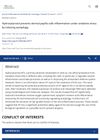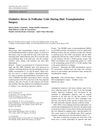March 2024 in “International journal of molecular sciences” The research identified key proteins that affect wool fiber thickness in Angora rabbits.
December 2021 in “Cosmetics”  280 citations,
July 2018 in “Antioxidants”
280 citations,
July 2018 in “Antioxidants” Treatments that reduce oxidative stress and fix mitochondrial problems may help heal chronic wounds.
210 citations,
May 2006 in “The FASEB journal” Oxidative stress causes hair to gray by damaging and killing pigment cells.
 93 citations,
February 2015 in “Journal of Investigative Dermatology”
93 citations,
February 2015 in “Journal of Investigative Dermatology” Oxidative stress affects hair loss in men with androgenetic alopecia.
 73 citations,
January 2013 in “European journal of dermatology/EJD. European journal of dermatology”
73 citations,
January 2013 in “European journal of dermatology/EJD. European journal of dermatology” Antioxidants may help fight oxidative stress linked to autoimmune skin diseases.
 65 citations,
May 2010 in “Current Women's Health Reviews”
65 citations,
May 2010 in “Current Women's Health Reviews” Oxidative stress is a key factor in the development of Polycystic Ovary Syndrome, and weight management can improve symptoms.
62 citations,
July 2013 in “American Journal of Clinical Dermatology” Alopecia areata patients have higher oxidative stress and lower antioxidant levels.
 59 citations,
November 2015 in “International Journal of Cosmetic Science”
59 citations,
November 2015 in “International Journal of Cosmetic Science” Oxidative stress damages hair and contributes to aging, and managing it can help maintain hair health.
 58 citations,
October 2016 in “Journal of Investigative Dermatology”
58 citations,
October 2016 in “Journal of Investigative Dermatology” Activating Nrf2 protects human hair follicles from oxidative stress and helps prevent hair growth inhibition.
 53 citations,
October 2014 in “Free radical biology & medicine”
53 citations,
October 2014 in “Free radical biology & medicine” Defective mitochondrial DNA replication causes aging symptoms and increased oxidative damage in mice.
48 citations,
September 2020 in “Frontiers in Immunology” Loss of OGG1 increases skin inflammation and auto-antibodies in lupus.
 45 citations,
September 1998 in “Journal of Investigative Dermatology”
45 citations,
September 1998 in “Journal of Investigative Dermatology” The enzyme 17β-HSD type 2 mainly performs oxidation in human sebaceous glands, which may help protect against acne.
40 citations,
January 2018 in “International journal of trichology” Healthy scalp reduces hair loss by managing oxidative stress.
35 citations,
December 2014 in “Clinical and experimental dermatology” Oxidative stress may play a role in causing alopecia areata.
 30 citations,
July 2017 in “BioEssays”
30 citations,
July 2017 in “BioEssays” Activating NRF2 might help treat hair disorders by improving antioxidant defenses.
24 citations,
November 2015 in “International Journal of Cosmetic Science” Treating scalp issues with anti-dandruff shampoo improves hair health.
 24 citations,
January 2012 in “Journal of Cellular Biochemistry”
24 citations,
January 2012 in “Journal of Cellular Biochemistry” C-reactive protein helps monocytes stick to blood vessel cells by causing oxidative stress.
22 citations,
July 2015 in “PloS one” Foxp1 helps control hair stem cell growth and response to stress during hair growth cycles.
 16 citations,
November 2021 in “Antioxidants”
16 citations,
November 2021 in “Antioxidants” Managing oxidative stress might help treat low testosterone and related chronic diseases in aging men.
16 citations,
December 2018 in “Skin pharmacology and physiology” People with Alopecia Areata have higher oxidative stress and different enzyme activities compared to healthy individuals.
15 citations,
January 2023 in “Antioxidants” Oxidative stress plays a significant role in alopecia areata, and new treatments may include JAK inhibitors and antioxidants.
14 citations,
June 2021 in “Journal of dermatological science” Argan press cake extract might help grow hair and protect hair cells from damage and inflammation.
 13 citations,
July 2019 in “Journal of Biochemical and Molecular Toxicology”
13 citations,
July 2019 in “Journal of Biochemical and Molecular Toxicology” Hydroxytyrosol from olive oil helps protect hair cells from damage and could prevent hair loss.
 13 citations,
December 2016 in “Journal of Cosmetic Dermatology”
13 citations,
December 2016 in “Journal of Cosmetic Dermatology” Oxidative stress increases in early hair loss, and family history plays a role; antioxidants may help future treatments.
 13 citations,
December 2016 in “PubMed”
13 citations,
December 2016 in “PubMed” People with a common type of hair loss have higher stress levels in their body, and treatments that reduce this stress could help.
 12 citations,
February 2022 in “International Journal of Clinical Practice”
12 citations,
February 2022 in “International Journal of Clinical Practice” Oxidative stress is higher in women with PCOS, especially if they're obese, and it may increase their risk of heart disease.
 8 citations,
May 2020 in “Anais Brasileiros de Dermatologia”
8 citations,
May 2020 in “Anais Brasileiros de Dermatologia” Higher levels of ischemia-modified albumin in telogen effluvium patients may indicate oxidative stress.
8 citations,
January 2019 in “Turkish journal of medical sciences” Ischemic modified albumin could be a new indicator of oxidative stress in people with alopecia areata.
 8 citations,
July 2010 in “Aesthetic Plastic Surgery”
8 citations,
July 2010 in “Aesthetic Plastic Surgery” Adding more glutathione to the preservation solution doesn't reduce oxidative stress in hair transplants.
















